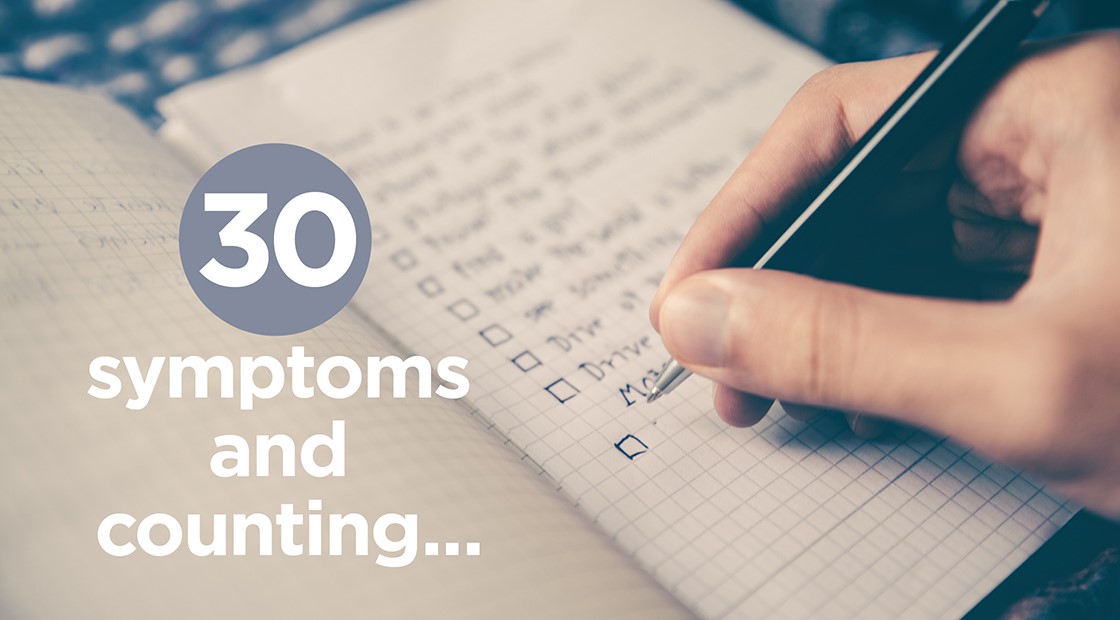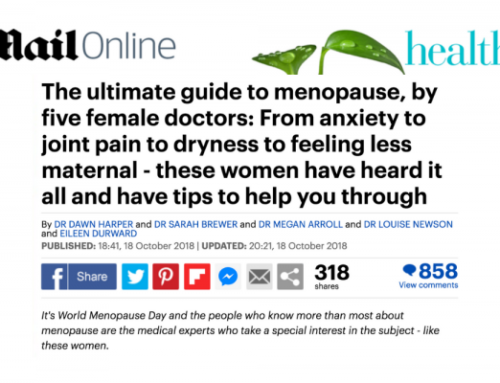…There are actually 34 symptoms associated with Menopause!
When we asked a group of women to name symptoms related to the menopause, they usually mentioned three or four of them but it turns out there are a staggering 34 symptoms of menopause in total.
According to a recent survey carried out by Regelle almost 1/3 of those affected by embarrassing symptoms of the menopause, such as vaginal dryness, don’t even seek help from their doctor. But other than vaginal dryness what should women be watching out for
1.Hair Loss
Hormonal changes can have all sorts of unexpected effects on the body and hair loss is one of them. Hair experts may recommend lifestyle changes but contact your doctor if you’re worried about it. There are lots of great products out there you can use to condition and thicken your hair as well.
2.Weight Gain
You might start gaining weight, particularly around the abdomen. Consistent and regular exercise is key during this life change. Ten minutes of yoga, a power walk or a class at the gym can all work wonders on both weight issues and your emotional state.
3.Brittle nails
One of the causes of weak nails is dehydration or lack of moisture in the body. Drink lots of water ideally 2 litres a day.
4.Sleep disorders
If you find you’re having trouble sleeping, try to avoid caffeine – found in coffee, tea and chocolate – besides keeping you awake, it may also trigger hot flashes. Exercise and go to bed at the same time every day.
5.Electric shock sensation
This one surprised us too! Relaxation techniques or a good massage can help relieve these strange sensations.
6. Allergies
You may develop new allergies and allergic reactions. Learn the reasons behind your allergies and you’ll stand a better chance of overcoming them quickly.
7.Burning tongue
Ask your doctor to check your iron levels and something as simple as an iron tonic can make all the difference and get you through these testing times.
8.Loss of libido
This can be one of the most difficult symptoms to manage, often because you might not understand how and why this is happening but it is extremely common and not unusual.
9.Vaginal dryness
Three out of Four women suffer from vaginal dryness and 22.5% of women say vaginal dryness affects their confidence, according to a recent survey from Kora Healthcare. This can translate to a poor experience in the bedroom. There is nothing wrong with using a little aid to help you feel more comfortable between the sheets. Regelle is a vaginal moisturiser that comes in a discreet applicator and is intended for the relief of vaginal dryness.
10.Gum disorder
You can become more susceptible to gum disease following menopause. If you’re experiencing this, consult your dentist. Brush your teeth carefully and avoid sugar.
11.Mood Swings
The best place to start is to look at what and how you eat. This doesn’t mean you should go on a crash diet but rather get into the routine of eating freshly cooked healthy meals and avoiding high fat foods and sugar where possible.
12.Fatigue
A power nap is an essential tool to renew our mind and bodies. Many women find it helpful to have a short 20 minutes nap during the day to reduce fatigue.
13.Irritability
Avoid refined carbs and sugars to keep your blood sugar levels stable and your stress levels down.
14.Memory lapse
Writing everything down, a ‘to do’ list and keeping a diary can help you stay on track.
15.Dizziness
Green vegetables with lots of substance, such as broccoli and asparagus can help. A lack of vitamins B9 (folic acid) and B12 can cause this dizziness.
16.Bloating
Skip chewing gum and carbonated beverages: These can fill up your stomach with air, leaving you with a bloated abdomen and avoid smoking and alcohol if you can.
17.Incontinence
You may not be able to control your bladder as you did before – pelvic floor exercises can help or your pharmacist can recommend a suitable remedy.
18.Night sweats
Have a bottle of water by your bedside and try to avoid hot baths or showers within an hour of sleep.
19.Irregular heartbeat
Reducing your intake of caffeine can significantly reduce heart palpitations. Limit consumption of stimulants, cigarettes, and alcohol as much as possible.
20.Depression
Diet can help relieve symptoms of menopausal depression. Foods such as nuts, eggs and turkey can help with mood boosting because they boost the production of serotonin.
21.Anxiety
The hormonal changes that happen during menopause can also drive feelings of anxiety. Try going for a walk outside or burning lavender oil. Massage and meditation can also help.
22.Breast Pain
Breast soreness should improve once your periods stop and your body no longer produces oestrogen.
23.Headache
Aim to drink about two- three litres of water every day to prevent dehydration and cut down on hormonal headaches.
24.Joint Pain
Fill your fridge with leafy greens and beans to ease the pain and avoid high impact sport.
25.Digestive problems
Alleviated simply by drinking more water or eating a balanced, fibre-rich diet.
26.Osteoporosis
Weight bearing exercises (exercises that make your muscles work against gravity) are best for prevention of osteoporosis and should be done at least three times a week.
27.Tingling extremities
A good, balanced diet, hydration, and adequate sleep are basic lifestyle measures that can help.
28.Change in body odour
Shower regularly and invest in a good deodorant to help a change in body odour.
29.Difficulty concentrating
The main reason why this occurs is because of a decrease in oestrogen. However, not getting enough sleep or sleep disruptions can also contribute to memory problems and cause issues with concentration.
30.Hot flashes
These are one of the most common symptoms of menopause. Invest in a portable fan and cool yourself down throughout the day.
31.Itchy crawly skin
There are some daily habits that can protect your skin from itchiness, such as avoiding the sun for too long and using tea tree, avocado, or almond oil for cleaning.
32.Irregular periods
Irregular periods are one of the first symptoms of menopause. Periods usually become erratic before they stop altogether.
33.Bloating
Yoga employs a number of exercises as well as sitting positions and meditations that are great in eliminating gas and excess water that can lead to bloating
34. Panic Disorders
You should first make sure your diet is healthy and has all the essential nutrients. It’s also a good idea to make sure that you get proper exercise and a good night’s sleep.
If you have any questions about Vaginal Dryness and our product Regelle, we would love to hear from you. You can also follow us on social media to join our community and join the conversation with Regelle on Women’s Health.









